Pete Sutton's Blog, page 24
May 4, 2016
Guest Post - Andrew Joyce
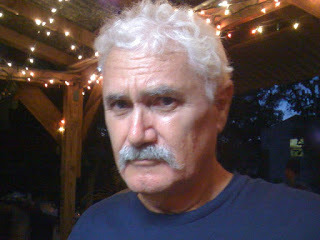
Andrew Joyce left high school at seventeen to hitchhike throughout the US, Canada, and Mexico. He wouldn’t return from his journey until decades later when he decided to become a writer. Joyce has written four books, including a two-volume collection of one hundred and forty short stories comprised of his hitching adventures called BEDTIME STORIES FOR GROWN-UPS (as yet unpublished), and his latest novel, RESOLUTION. He now lives aboard a boat in Fort Lauderdale,
Florida, with his dog, Danny, where he is busy working on his next book, YELLOW HAIR.
In his own words - My name is Andrew Joyce, and I write books for a living. Pete has been kind enough to allow me a little space on his blog to promote my new book, RESOLUTION: Huck Finn’s Greatest Adventure, so I thought I’d tell you how it came about. It all started way back in 2011 . . .
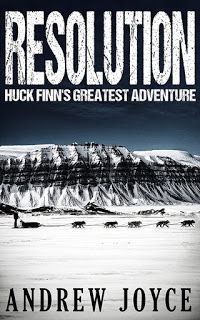
My first book was a 164,000-word historical novel. And in the publishing world, anything over 80,000 words for a first-time author is heresy. Or so I was told time and time again when I approached an agent for representation. After two years of research and writing, and a year of trying to secure the services of an agent, I got angry. To be told that my efforts were meaningless was somewhat demoralizing to say the least. I mean, those rejections were coming from people who had never even read my book.
“So you want an 80,000-word novel?” I said to no one in particular, unless you count my dog, because he was the only one around at the time. Consequently, I decided to show them City Slickers that I could write an 80,000-word novel!
I had just finished reading Mark Twain’s Huckleberry Finn for the third time, and I started thinking about whatever happened to those boys, Tom and Huck. They must have grown up, but then what? So I sat down at my computer and banged out REDEMPTION: The Further Adventures of Huck Finn and Tom Sawyer in two months; then sent out query letters to agents.
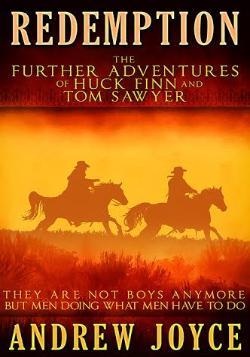
Less than a month later, the chairman of one of the biggest agencies in New York City emailed me that he loved the story. We signed a contract and it was off to the races, or so I thought. But then the real fun began: the serious editing. Seven months later, I gave birth to Huck and Tom as adults. And just for the record, the final word count is 79,914. The book went on to reach #1 status in its category on Amazon—twice. The rest, as they say, is history.
But not quite.
My agent then wanted me to write a sequel, but I had other plans. I was in the middle of editing down my first novel (that had been rejected by 1,876,324 agents . . . or so it seemed) from 164,000 words to the present 142,000. However, he was insistent about a sequel, so I started to think about it. Now, one thing you have to understand is that I tied up all the loose ends at the end of REDEMPTION, so there was no way that I could write a sequel. And that is when Molly asked me to tell her story. Molly was a minor character that we met briefly in the first chapter of REDEMPTION, and then she is not heard from again.
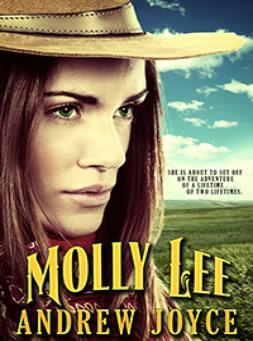
So I started to think about whatever happened to her. After a bit of time—and 100,000 words—we find out what did happen to Molly. It is an adventure tale where Huck Finn weaves through the periphery of a story driven by a feisty female lead. Molly Lee was my second book, which achieved #2 status on Amazon.
Now I was finished with Huck Finn for good. Now I could go back to my first novel and resume the editing process.
But not quite.
It was then that Huck and Molly ganged up on me and demanded that I resolve their lives once and for all. It seems that I had left them hanging, so to speak. Hence, RESOLUTION: Huck Finn’s Greatest Adventure .
The three books are stand-alones and are not part of a series. They can be read in any order. RESOLUTION is available as an eBook and in print. Both versions are available on Amazon.There you have it. Now, if you nice people will just go out and buy RESOLUTION , perhaps Huck and Molly will leave me alone long enough so that I can get some editing done on my first novel.Thanks for having me over, Pete. It’s been a real pleasure.
Andrew
Many thanks to Andrew for the interesting post - go check out Resolution:
It is 1896 in the Yukon Territory, Canada. The largest gold strike in the annals of human history has just been made; however, word of the discovery will not reach the outside world for another year.By happenstance, a fifty-nine-year-old Huck Finn and his lady friend, Molly Lee, are on hand, but they are not interested in gold. They have come to that neck of the woods seeking adventure.Someone should have warned them, “Be careful what you wish for.”
When disaster strikes, they volunteer to save the day by making an arduous six hundred mile journey by dog sled in the depths of a Yukon winter. They race against time, nature, and man. With the temperature hovering around seventy degrees below zero, they must fight every day if they are to live to see the next.
On the frozen trail, they are put upon by murderers, hungry wolves, and hostile Indians, but those adversaries have nothing over the weather. At seventy below, your spit freezes a foot from your face. Your cheeks burn—your skin turns purple and black as it dies from the cold. You are in constant danger of losing fingers and toes to frostbite.
It is into this world that Huck and Molly race.
They cannot stop. They cannot turn back. They can only go on. Lives hang in the balance—including theirs.
Published on May 04, 2016 03:16
May 3, 2016
Interview - Will Macmillan Jones
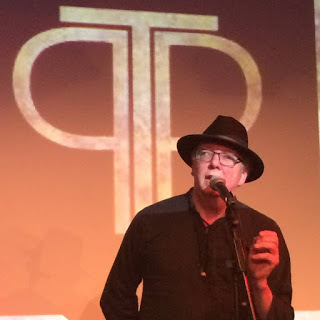 Will Macmillan Jones lives in Wales, a lovely green, verdant land with a rich cultural heritage. He does his best to support this heritage by drinking the local beer and shouting loud encouragement whenever International Rugby is on the TV. A fifty something lover of blues, rock and jazz he has just fulfilled a lifetime ambition by filling an entire wall of his home office with (full) bookcases. When not writing, he is usually lost with the help of a satnav on top of a large hill in the middle of nowhere.
Will Macmillan Jones lives in Wales, a lovely green, verdant land with a rich cultural heritage. He does his best to support this heritage by drinking the local beer and shouting loud encouragement whenever International Rugby is on the TV. A fifty something lover of blues, rock and jazz he has just fulfilled a lifetime ambition by filling an entire wall of his home office with (full) bookcases. When not writing, he is usually lost with the help of a satnav on top of a large hill in the middle of nowhere.His major comic fantasy series, released by Red Kite Publishing, can be found at:www.thebannedunderground.com
and information on his other work and stuff in general at :www.willmacmillanjones.com
There’s a blog. There’s always a blog, isn’t there?www.willmacmillanjones.wordpress.com
For anyone that hasn’t read them can you tell us a bit about your books
Anyone? More like everyone, I’d have thought as I have the profile of a snail hiding in a fully grown lettuce patch. I write Gothic Horror/ Paranormal Mysteries - The Mister Jones collection - and comic fantasy; The Banned Underground stories. I also dabble in children’s fantasy and quite bizarrely (especially if you ever spoke to my ex) I have a Romance novel, The Last Viking, coming along in due time.
The horror allows me to release the dark side of my imagination, and give it full rein and licence. (Or is that the romance book? It’s so easy to get confused between the two, isn’t it?) Actually the first in that collection, The Showing, is based on a real house and on my childhood memories of my Grandfather’s house. Which was intensely scary. But I’ll say no more right now.
The Banned Underground are my first real creation. Here I can tell all the silly jokes and indulge my love of slapstick humour to the full, whilst addressing the occasional real issue at the same time. The SatNav of Doom was partly about my dislike of Capitalist economics, although you’d probably have to read it quite carefully to see that. The sixth book looks at personal responsibility, and the seventh (nearing completion now for release later this year) is about prejudice. Why am I giving my secrets away? Is there something in this coffee? Anyway, if your humour level has you laughing at Red Dwarf then you are my target audience. Sit still long enough, and one of the gags will hit you.
Tell us a bit more about the last book you wrote
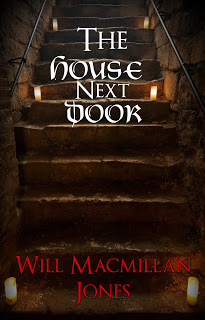
The House Next Door is the third in my stand alone collection of Gothic Horror novels, featuring the poor, unfortunate, Mister Jones whose karmic burden has destined him to be a catalyst for paranormal events. In this instalment, his next door neighbour buys a statue in a strange little shop and gets rather more than she bargained for. In fact a lot more, as the statue contains an imprisoned ancient spirit that is striving to break free and unleash mayhem. As the casualty list rises, and the dead walk free, it is up to Mister Jones to stop the tide of evil - or drown in it himself. My object all sublime (as The Lord High Executioner might say) is to make readers have to think twice before they turn off their bedroom light at night. Mmmmm.
The next book in the collection, The Curse of Clyffe House, will be released late summer this year and I’m working on the fifth one (Demon’s Reach) now. I can exclusively reveal to Bristol Book Blog that there is a hidden story arc in the whole collection, that is slowly starting to be revealed and may become more apparent in Demon’s Reach.
What did you learn about writing whilst writing the last book you wrote?
Commas. I’ve a thing about commas. The humble ‘,’ is a lovesome thing, and the Regal Oxford Comma beautiful, with such desirable statuesque curves... sorry, where was I? Oh yes. When I’m writing, I have a bad habit with commas. Because I do a lot of spoken word events and read a lot of my work aloud, I tend to be speaking the words aloud in my head as I type them - and when I pause for a virtual breath I type a comma. Hence I have a tendency to wildly overuse them and every manuscript has to have a cull. One editor pointed this out so bluntly when reviewing The House Next Door that I’ve really taken it to heart and intend to work harder on the next book to eliminate this issue.
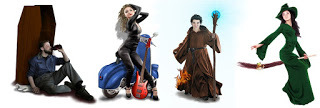
Do you have a set writing process, if so what is it?
I sit at my desk, and type… I’m lucky. You see I’m self-employed (I am actually an ex-Inland Revenue international taxation consultant, which explains why the evil wizards in The Banned Underground collection are accountants in their day jobs) and work from home. So I spend a lot of time at my desk in my study, surrounded on all sides by bookcases - and when I have spare time, or inspiration calls, then I can just turn to the WIP and get on with it. It is not uncommon for me to have two books in progress at any time, and so I always have something to attack.
Do you write a lot of short stories
Flash Fiction yes, short stories per se, no. Normally I enter some Flash competitions, but for the last year or so I have been doing more poetry in order to help my public performance skills. Next year I’ll go back to Flashing. That sounds wrong, doesn’t it? Oh dear.
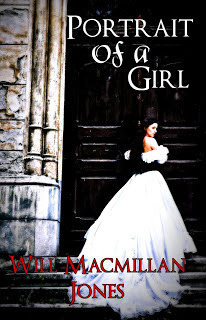
Do you prefer the long or short form? How do you feel about Flash Fiction?
None of my books are particularly long. My first publisher spent time with me, teaching me about the financial aspects of the business, as in another world I have a background in tax and accountancy: so he showed me how the numbers worked to bring a book to market at a set price, rather than complete a book and find it hard to market at a competitive price point. That’s for paperbacks of course, not ebooks - but what author doesn’t want to sell real books to customers as well as ebooks to the internet?
I do in fact write quite a lot of Flash Fiction, in fact I’ve won a national competition a year or so ago with one piece. I do a lot of spoken word events and performances, and Flash Fiction lends itself perfectly to that sort of thing. Plus I think that writing Flash is an excellent practice for an author. It teaches a great deal about word placement and structure; when a complete story has to be told, and be interesting and engaging in a thousand words, the author has to put in some real effort to get things right - and learns a great deal in the process.
Which character in your books do you most identify with and why?
Oh, that would be telling, wouldn’t it? I know there has been some speculation about Mister Jones, but that is a long way off the mark. That character has actually nothing to do with me. Honest. No, there is a character in The Banned Underground books who is based heavily on me, but I’m not telling.
Which bit of your writing are you most proud of?
It would be easy to say a book, or a piece of Flash Fiction, or a prize winning piece, wouldn’t it? But actually it is a piece of poetry I wrote about depression. It’s quite strong, and usually silences an audience. You may not know, but at the annual British Fantasy Society convention (Scarborough, this year) there is often a poetry performance and Black Dog -this piece- went down well there last year too.
Tell us a bit about how you got published? Did you go via a slush pile? Get an agent before a publisher?
I was picked up by a small press, as are so many indie writers, for The Banned Underground; then another small press took on The Showing, the first of the Gothic Horror novels. The second press absconded with the royalties due to about thirty authors, and the first has finally closed its doors after a number of incarnations. Presently I’m under contract to a company controlled by a firm that has been publishing revision guides, and is just moving into fiction. I’m not the only author with such a story of course, and it does help explain my current low profile as proper bookshop availability and distribution will only come on stream this summer.
In one sentence what is your best piece of advice for new writers?
Read. Widely. Whatever your chosen genre, you should know it inside out;* and then read other genres too as they will help other aspects of your writing.
*At Waterstones signings I’ve been known to hang about near the fantasy section and point customers who do not fancy my stuff at other books they may like. Once, in Leeds, I was able to tell a man who had forgotten the title and author of a book he had just driven thirty miles to buy exactly what he wanted. He was so grateful he bought two of mine in thanks - and because it was cheaper than the petrol for another round trip to check up on what he wanted… Know your genre.
Website links:
www.willmacmillanjones.com
www.thebannedunderground.com
Published on May 03, 2016 01:36
April 26, 2016
Guest post - Juliet McKenna
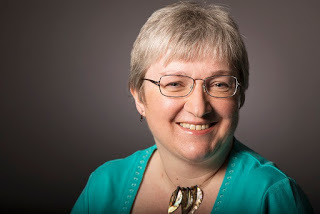 Juliet E McKenna is a British fantasy author. Her debut, The Thief's Gamble, appeared in 1999 followed by 14 further novels. She also writes diverse shorter fiction, reviews for web and print magazines, teaches and comments on book trade issues. Currently exploring new opportunities in digital publishing, she’s re-issuing her backlist in association with Wizard’s Tower Press. This week sees the ebook publication of Eastern Tide, final volume of The Aldabreshin Compass. Find out more at www.julietemckenna.com
Juliet E McKenna is a British fantasy author. Her debut, The Thief's Gamble, appeared in 1999 followed by 14 further novels. She also writes diverse shorter fiction, reviews for web and print magazines, teaches and comments on book trade issues. Currently exploring new opportunities in digital publishing, she’s re-issuing her backlist in association with Wizard’s Tower Press. This week sees the ebook publication of Eastern Tide, final volume of The Aldabreshin Compass. Find out more at www.julietemckenna.com Juliet has dropped by to talk about the women of the Aldabreshin Compass
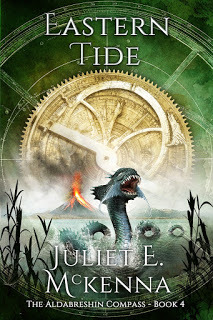
Silk Gowns and Bejewelled Glamour – The Women of the Aldabreshin Archipelago
As anyone who’s heard me talking about – or demonstrating – practical fighting skills at SF conventions will know, I have no patience with the notion that women cannot be capable warriors in epic fantasy, or indeed anything else they put their minds to, from merchants to monarchs. Claims that women in imaginary secondary worlds must lead timid, trammelled lives because that’s ‘historically accurate’ get equally short shrift from me. There are countless real world examples to contradict this in every culture and period. Yes, these were remarkable women – but so were the great men whose deeds are praised in every history book that leaves women out. Consequently the female characters in The Tales of Einarinnabsolutely make their own choices and make a whole lot of things happen, from Livak, gambler and thief, through Halice, captain of mercenaries, to Mellitha, powerful and wealthy magewoman, to name but a very few.
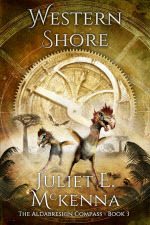
So what about the women in the Aldabreshin Archipelago? Because they are very different indeed. Everyone on the Einarinn mainland knows that. They’re painted, pampered ornaments decorating an all-powerful warlord’s household and bearing his children. Each domain’s ruler will have three, four or more wives at his beck and call, to gratify his every lust. If he’s feeling particularly generous, he’ll offer their sexual favours to other men. In between times, these women, caged like songbirds, are guarded by armed men, relieving their boredom with idle pastimes like gambling. Everyone knows that.
Seriously? I’m really writing women who are no different to the passively distressed damsels who’ve so irritated me in fantasy fiction? The ones wholly defined by their relationships with plot-central men, and whose main function is to end up as the hero’s reward in bed in the final chapter, often after a series of implausible, plot-convenient escapes from rape?
Hardly! As Ryshad discovers in The Swordsman’s Oath, and as I was able to explore far more fully in The Aldabreshin Compass series, “what everyone knows” in Einarinn is just as likely to be biased and ignorant as it is in real life.
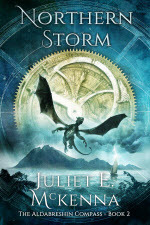
Yes, these women do wear flamboyant jewellery and lavish silk gowns. Since they’re the ones who manage all trade in the Archipelago, that’s a display of their prowess in the complicated barter system of that cashless economy. They certainly do favour extravagant, dramatic cosmetics – because that makes their faces so much harder to read in the midst of tense negotiation. Any warlord would be very ill-advised to think he could manage his domain’s commerce any better than his wives who build complex networks of friendship and obligation with the women married to other warlords. They are constantly writing letters to each other as well as using merchants and couriers as their eyes and ears over the length and breadth of this vast island chain.
Okay, but what about the sex? Yes, these women do sleep with men other than their husbands, but that’s only ever at their own wish. Why would they want to? Well, a warlord’s wives are certainly expected to provide children to secure the next generation’s rule over the domain. What happens if a warlord is sterile, or gay or cannot have children for some other reason? What if the existing ties of blood and friendship between allied domains lead to a strategic marriage between two people who are unhealthily closely related? Then an Archipelagan noblewoman will choose someone else to father her offspring and no one else will have a say in the matter. And Archipelagan women do enjoy sex for its own sake. Why wouldn’t they? The Aldabreshi have sufficient practical knowledge of herbal and barrier contraceptives to limit unwanted pregnancy.
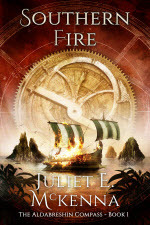
A warlord will gratefully raise the children his wife provides for him while the armed warrior-slave always at her side and answerable only to her, will make sure no one gets a chance to force himself on her. Not even her husband, if she decides he’s banished from her bed. An Archipelagan has no say if his wife decides to divorce him either. Some noblewomen move from domain to domain, using their trading acumen to win ever more wealth and influence. Those who’ve proven themselves doing deals as minor wives and daughters will be assiduously courted by warlords offering them higher status and greater scope for their talents, for the sake of the resources they can win for a domain.
So this is a very different vision of female power to that wielded on the mainland by women who take on the same occupations as men and do those things just as well. Archipelagan men and women have distinctly different and defined roles in society that complement each other rather than overlapping. Crucially, neither is subordinate to the other.
But isn’t this complete fantasy? Even for a secondary world where authors really could and arguably should be bolder in imagining cultures without the burdens of our own historical inequalities and bias? Actually, no, it really isn’t. In creating the very different lives of Aldabreshin women, I drew on real world examples of both individuals and cultures from times and places as far afield as Polynesia before Europe’s voyages of discovery and archaic Persia. There’s precedent for everything I use, up to and including the sexual freedom these women enjoy.
Of course this isn’t to say these women live idyllic lives. But the challenges and perils for female characters in The Aldabreshin Compass series stem from the actions and characters of those who surround them, for good and ill, in exactly the same way as such things arise for the men. What are those demands and dangers? You’ll have to read the books to find out.
Many Thanks to Juliet for the post - do please go check out her books here
Published on April 26, 2016 01:47
April 25, 2016
Guest Post - Martin Owton
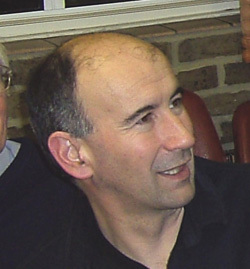
Martin Owton is a Fantasy and Science Fiction writer represented by Ian Drury of Shiel Land Associates. He is a member of the T-Party Writers Group and Rushmoor Writers. He runs and takes part in pub quizzes and follows the fortunes of Southampton FC. In his real life job he is a scientific researcher for a major pharmaceuticals company. He is married and lives in Lightwater, Surrey.
He's dropped in to talk about what he learned whilst writing his book Exile - which is available now!
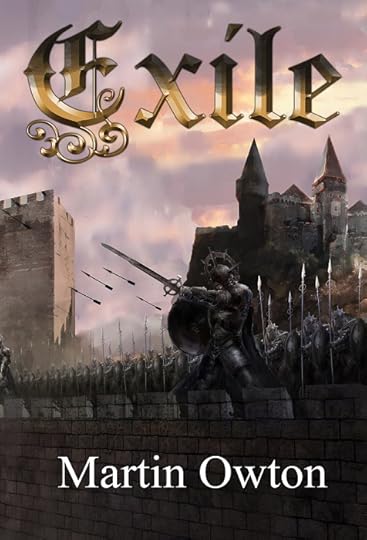
What I learned writing ‘Exile’
I can write a novel length story. Before ‘Exile’ I had only written short stories, indeed ‘Exile’ was a short story that just didn’t want to stop, and I didn’t know that I could build a solid enough story arc to last 100k words complete with subplots.It is possible to leave a manuscript alone for months, come back to it and pick it up smoothly enough that no-one notices the join.Critique is good, and if more than 3 people raise the same point you need to do something about it.When you come to reread the story you can’t tell the difference between the sentence you wrote when you were really flying, and the sentence that was ground out on a night when you wrote 100 words.That your characters really do tell you what they’re going to do next. This shows that they are well-realised and you understand their motivations.That once the story is rolling I like working with readers who are into the story. I did this on ‘Exile’, sending out a finished chapter to my readers, getting their feedback and then storyboarding what would happen next. I’ve written subsequent novels without this and missed it.That a paid edit can be very valuable. I paid John Jarrold (before he took up agenting) to read ‘Exile’; he found flaws others had missed. On the basis of his comments I added two chapters which improved the manuscript greatly and taught me how to work with an editor. It was this version of the manuscript that gained me representation.
Published on April 25, 2016 03:50
April 22, 2016
Guest Post - Stephanie Burgis
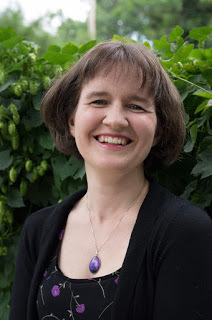
Stephanie writes fun, funny MG fantasy adventures and wildly romantic historical fantasy novels for adults.You can sign up for her newsletter for news about upcoming books and stories; you can read her blog; and you can find her on Twitter, Facebook and Pinterest.Stephanies book - Masks and Shadows - “An eloquent and offbeat mix of dark fantasy, alchemy, and spycraft.”– Faren Miller, Locus Magazine
Is available to purchase now:
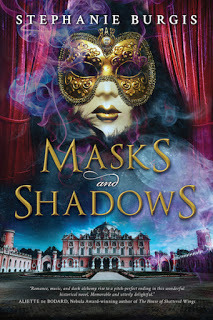 Stephanie dropped by to talk about music and writingI always knew, from the time I was seven years old, that I wanted to be a writer. But I also knew that I’d have to have a day job to keep me going…and at thirteen, I finally figured out what I loved almost as much as writing: music!
Stephanie dropped by to talk about music and writingI always knew, from the time I was seven years old, that I wanted to be a writer. But I also knew that I’d have to have a day job to keep me going…and at thirteen, I finally figured out what I loved almost as much as writing: music!So I decided to be a musician, as my practical, sensible day job.
Hahahaha. Yes, I know. I do! I was not a practical-minded teenager. But I wasa determined one…
…So I went to conservatory as a French horn performance major, and I added on a music history double major, two years in, when I realized that I didn’t really want to be an orchestral musician after all. Then I spent several years as a postgrad musicology student, first at the University of Vienna on a Fulbright scholarship, then in Pittsburgh, and finally in Leeds as a PhD student there, shifting closer and closer to what I liked best by studying opera history… and then I finally got an actual day job for two years, working at an opera company.
Now here I am, as a full time writer after all. And quite often, people ask me: how did music affect your writing?
Usually, my answers are a little vague… or at least, they’re based on larger principles. This is the one I usually fall back on:
Music taught me discipline. When you have to practice your French horn for three hours a day on top of rehearsals (and coursework), you really do have to learn self-discipline, and the art of forcing yourself to sit down and get it done.
Honestly, that’s a skill whose value can’t be overestimated, as a freelance writer.
But finally, with my new book, I can give a better, more specific answer… because in my new book, Masks and Shadows, all my love of music finally found a full outlet in my writing.
[image error]
Masks and Shadows is set at the Hungarian palace of Eszterháza in 1779, when Joseph Haydn was the Kapellmeister there, creating beautiful operas for his royal employer, Prince Nikolaus Esterházy. Not-so-coincidentally, my own PhD research focused on opera and politics in late-eighteenth-century Vienna and Eszterháza… and the drama in Masks and Shadows all swirls around the jewelbox opera house at Eszterháza, as Haydn and his singers work to create a sparkling new opera in time for an Imperial visit, a superstar castrato singer visits the palace and falls into a forbidden love affair, a maid finally finds an outlet for her own voice… and a secret society plans a terrifying, alchemical finale.
But my musical background didn’t only come out in the subject of this book. I wrote the book itself as an opera. It’s divided into acts, not parts, and characters weave in and out just as they would in an eighteenth-century opera, experiencing love and fear and betrayal and passion, all building up to a massive Act III finale.
[image error]
As I wrote, I listened to all of my favorite Haydn operas, as well as the soundtrack to the movie “Farinelli” (in honor of my castrato hero). But I could also feel a new opera thrumming through me as I wrote… an opera in the form of a novel.
I hope you guys enjoy it!
Many thanks to Stephanie for her post - go buy her book!
Published on April 22, 2016 02:24
Guest Post - Stephanie Brgess

Stephanie writes fun, funny MG fantasy adventures and wildly romantic historical fantasy novels for adults.You can sign up for her newsletter for news about upcoming books and stories; you can read her blog; and you can find her on Twitter, Facebook and Pinterest.Stephanies book - Masks and Shadows - “An eloquent and offbeat mix of dark fantasy, alchemy, and spycraft.”– Faren Miller, Locus Magazine
Is available to purchase now:
 Stephanie dropped by to talk about music and writingI always knew, from the time I was seven years old, that I wanted to be a writer. But I also knew that I’d have to have a day job to keep me going…and at thirteen, I finally figured out what I loved almost as much as writing: music!
Stephanie dropped by to talk about music and writingI always knew, from the time I was seven years old, that I wanted to be a writer. But I also knew that I’d have to have a day job to keep me going…and at thirteen, I finally figured out what I loved almost as much as writing: music!So I decided to be a musician, as my practical, sensible day job.
Hahahaha. Yes, I know. I do! I was not a practical-minded teenager. But I wasa determined one…
…So I went to conservatory as a French horn performance major, and I added on a music history double major, two years in, when I realized that I didn’t really want to be an orchestral musician after all. Then I spent several years as a postgrad musicology student, first at the University of Vienna on a Fulbright scholarship, then in Pittsburgh, and finally in Leeds as a PhD student there, shifting closer and closer to what I liked best by studying opera history… and then I finally got an actual day job for two years, working at an opera company.
Now here I am, as a full time writer after all. And quite often, people ask me: how did music affect your writing?
Usually, my answers are a little vague… or at least, they’re based on larger principles. This is the one I usually fall back on:
Music taught me discipline. When you have to practice your French horn for three hours a day on top of rehearsals (and coursework), you really do have to learn self-discipline, and the art of forcing yourself to sit down and get it done.
Honestly, that’s a skill whose value can’t be overestimated, as a freelance writer.
But finally, with my new book, I can give a better, more specific answer… because in my new book, Masks and Shadows, all my love of music finally found a full outlet in my writing.
[image error]
Masks and Shadows is set at the Hungarian palace of Eszterháza in 1779, when Joseph Haydn was the Kapellmeister there, creating beautiful operas for his royal employer, Prince Nikolaus Esterházy. Not-so-coincidentally, my own PhD research focused on opera and politics in late-eighteenth-century Vienna and Eszterháza… and the drama in Masks and Shadows all swirls around the jewelbox opera house at Eszterháza, as Haydn and his singers work to create a sparkling new opera in time for an Imperial visit, a superstar castrato singer visits the palace and falls into a forbidden love affair, a maid finally finds an outlet for her own voice… and a secret society plans a terrifying, alchemical finale.
But my musical background didn’t only come out in the subject of this book. I wrote the book itself as an opera. It’s divided into acts, not parts, and characters weave in and out just as they would in an eighteenth-century opera, experiencing love and fear and betrayal and passion, all building up to a massive Act III finale.
[image error]
As I wrote, I listened to all of my favorite Haydn operas, as well as the soundtrack to the movie “Farinelli” (in honor of my castrato hero). But I could also feel a new opera thrumming through me as I wrote… an opera in the form of a novel.
I hope you guys enjoy it!
Many thanks to Stephanie for her post - go buy her book!
Published on April 22, 2016 02:24
Friday Flash
I did this quickly - on a Facebook post about the government burying bad news -
Bad News
"What we need," said the government PR guru, "is some really bad news."
"Bad news?" the Prime Minister said, "we've got tons of bad news!"
"No what I meant was we need to bury our bad news under worse news."
"Go on." The Prime Minister leant forward with a hawkish expression.
"Well, if a loved celebrity dies, or a boat sinks, or there's a massive fire, all the news will focus on that and we can quietly announce these policies. So let's wait for an opportune moment."
"I have a better idea," the Prime Minister said as he sat back and steepled his fingers, "let's engineer some worse news. Who would you say the proles would miss more, a pop star or a comedian?" He picked up the black ops phone and pressed the speed dial. "Hello? We have some wet work for you..."
Bad News
"What we need," said the government PR guru, "is some really bad news."
"Bad news?" the Prime Minister said, "we've got tons of bad news!"
"No what I meant was we need to bury our bad news under worse news."
"Go on." The Prime Minister leant forward with a hawkish expression.
"Well, if a loved celebrity dies, or a boat sinks, or there's a massive fire, all the news will focus on that and we can quietly announce these policies. So let's wait for an opportune moment."
"I have a better idea," the Prime Minister said as he sat back and steepled his fingers, "let's engineer some worse news. Who would you say the proles would miss more, a pop star or a comedian?" He picked up the black ops phone and pressed the speed dial. "Hello? We have some wet work for you..."
Published on April 22, 2016 02:02
April 19, 2016
Interview with Matt Duggan & review of Dystopia 38:10
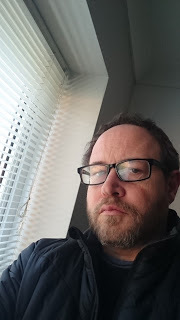
Matt Duggan is a Bristol born imagist poet, who won the prestigious erbacce prize for poetry from well over 5,000 entries worldwide. Matt has had his poems published in over sixty journals and magazines, and is involved in many other artistic projects.
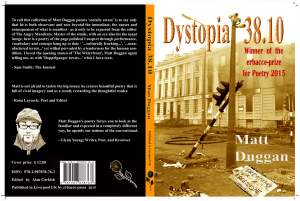
When you tell people you are a poet how do you describe what you write?
I would say that I’m a contemporary imagist poet and have been influenced by imagery in writing, like the poetry of Ezra Pound and many other imagist authors. I like to write about a mixture of themes sometimes controversial, sometimes touching on the plights and strengths of the human condition, also on subject matters that are rarely written about, like events in history, I like experimenting with form, colour, shape, and rhythm.
What is the significance of the title?
The title of my new collection Dystopia 38.10 (erbacce-press) refers to the title poem, the title poem is the 38thpoem in the collection and is a sequence of ten poems, but this is no futuristic dystopia, this is very much a contemporary dystopia, the title poems takes you on a journey, a journey that builds like a crescendo. The poems are descriptive, and sometimes brutal, yet layered with a fondness for human tenderness.
What are you currently working on (apart from this interview of course!)?
Well, I’m working on several projects at the moment my next collection of poems ‘Kinematophy’ the title poem being a journey through the history of propaganda and media manipulation which is scheduled for publication (Erbacce Press) late 2017/18. A pamphlet which I’ve just finished editing titled ‘The Ghosts of Devon’, plus, a long sequence poem which I’ve been working on for the last two years titled ‘El Tajo’ this poem was inspired by a trip I took to Ronda in Spain a few years ago. Many poets and authors have also been inspired such as Hemingway and Rilke, the poem highlights several aspects of history that the town would like to forget like when Franco and his troops threw people from the cliffs of El Tajo. The town for me is like a poetic utopia, such beautiful imagery spiralling in every direction, simply perfect for writing. Plus, another poem The Dower House which is based on my experiences of working at Stoke Park Hospital, the poem also details the beginning of this institute and the various myths that surround it, such as The Grey Lady who was a ghost on horseback, sometimes sighted riding by Duchess Pond.
What did you do the day after you'd heard you won the Erbacce prize?
It took me several days to come down off the ceiling when I found out I won the prize, but I did go out and celebrate, and celebrate a bit too much! A three day bender followed by a three day hangover!! I had a week with an almost permanent smile that just wouldn’t go away, I was so tempted this year to enter again, but I think I’ll leave it. Personally I do think it’s one of the best poetry competitions around, not because I won it but because its free entry, I see so many competitions that charge the earth and if you are paying more than eight pounds per poem I think is far too steep I get fed up when poets are ripped off like this Anyway, the erbacce prize is definitely worth entering, and I’m so glad that I did, because for me erbacce press have published some of my favourite poets, and I respect everything they’ve done, both Alan and Andrew at erbacce have been so supportive. Plus, we have two events coming up soon with one for the Bristol Poetry Festival and another for the Bristol Festival of Literature where seven erbacce poets will be reading, those events will be towards the end of this year.
Who are you currently reading?
I’m currently reading a few books at the moment and have nearly finished Laureate’s Block by Tony Harrison, but I’m also reading Wine and Hashish by Charles Baudelaire, A New Acmeism by Sam Smith, Ghosts of Spain: Travels Through Spain and its Silent Past, which is research for my ‘El Tajo’ poems, plus Ping-Pong in the Rain by Knotbrook Taylor which won the erbacce prize in 2014, and ‘Guardians of Power’ by David Edwards which is another book I’m using for research for my Kinematophy poems.
Who would you recommend us reading?
I would say Rainer Maria Rilke, Ezra Pound, Tony Harrison, Arthur Rimbaud, Charles Bukowski, Weldon Kees, Paul Verlaine, Federico Garcia Lorca, Paul Eluard, John Berryman, to name just a few. Where are you currently reading them?
I suppose anywhere really, finding the time mainly but I do try and read most days, and I do like reading several books at a time, time management is a big problem.
What magazines and websites are invaluable for a poet?
Well magazine wise I have a few favourites but then every poet has their preference, mine would be The Journal , The Seventh Quarry , and The Dawntreader , and I do like Lunar Poetry Magazine , websites I suppose would be New Pages , Poetry Markets , Poetry Library Website , and Literistic are great sources, all of these are essential for current news, new submissions, new magazines etc
Which poem of yours are you most proud of, and why?
Good question, I suppose I’d say Genocide and Ithaca poems and both of them for different reasons, the Genocide poem highlights the Armenian Genocide and what happened, I wanted to write something for the centenary plus I was disgusted by the media coverage of the event, a ten second clip on the news and that was it, I mean what is more important covering the centenary where 1.5 million Armenians, Greeks and Syrians were murdered or ten minutes of the royals attending another centenary for allied troops landing, it was disgraceful!
Ithaca I love, as I love the place and I love reading that poem it does mean a lot to me. I stayed in Ithaca last year and I will be returning one day as there is so much poetry that you can write about on that island, plus it reminds me of the two Greek poets I met and heard read in Greek and English, and I have to say it was the best reading of poetry that I’ve ever heard, I’ve kept in contact with both of them and I’m hoping to do a reading with them next time I visit.
What makes a good poem good?
Well for me it has to have the correct imagery but not too much imagery, the meaning and focus of the poem to be apparent but not obvious, also clever rhyming and rhythm, again not obvious rhymes with any clichés do help. Experimenting with form and also the theme can make a poem stand out more. We can all write a poem about an event on the news, or the death of a celebrity, the me, me, me poems, yet tackling a theme in a different way or writing about a theme that is rarely written about, stands out for me, but poetry after all is subjective, but this is what I personally like in a poem.
In one sentence what is your best piece of advice for new writers?
Advice I suppose would be buy poetry books, attend open mics, submit, submit, submit, be a part of the local writing/poetry scene. Support independent presses, subscribe to magazines and support poetry because it won’t support you, read as much poetry as possible until you feel you’ve found your voice, be unique and try something new and different. I’ve come across poets before who don’t buy poetry books and then complain that they’ve been rejected and they wonder why!
Also don’t be put off by rejections we all get those, for example, when I started sending work out twenty odd years ago I sent 5 poems to five different magazines and they all rejected me, I then spent a lot of time developing my own voice and reading and buying different styles of poetry. I then re-submitted to the same magazines about a year later, and all five of those magazines accepted work by me, so, never give up trying if it’s really what you want. Plus, don’t clone the latest trend in poetry as most people will see through that even if you think people can’t, if you have the same style being performed again and again it does become somewhat tedious, but mainly enjoy it, and take that journey and the best of luck.
Bristol Book Blog review of Dystopia 38:10
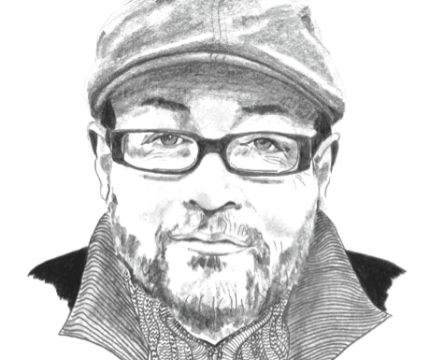
Divided into 4 zones Dystopia 38:10, by erbacce prize winner Matt Duggan is a masterful collection of imagist poetry. having heard Matt read his poems at various events through Bristol I couldn't help but have his voice in my head as I read this collection. But even if you come to it cold you couldn't help but be enthralled by the rhythm, imagery and emotion in these poems.
Many of them have a social edge, yet there is a wry humour in many. But it is obvious that the man behind the Angry Manifesto has much use for satire. Duggan plays with the language and manages to achieve what all good art should, he gets us to look at the world anew.
Poems about affairs with bacon and coming to terms with bald spots will entertain, but it is the more serious, the poems coming from anger at the world's injustices that will stay with you.
Highly Recommended
Published on April 19, 2016 02:36
April 15, 2016
Interview with Kate Coe
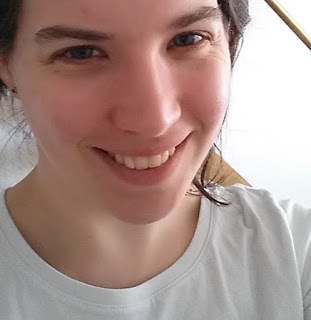
I'm a librarian with a background in classics and law, I live with an engineer and very grumpy bearded dragon, and I fill my spare time in between writing with web design, geeky cross-stitch and DIY (which may or may not involve destroying things).
My writing swings wildly depending on what is in my head at the time, and this has led to genres including urban fiction, steampunk-style fantasy, and a series of children's stories based on a library that I used to work in. My favourite character is a sloth with a speed addiction, my best writing moment was when one of my characters fell in love and completely changed the plot, and I write because I can't imagine not doing it - and it gets the voices out of my head for five minutes...
News and thoughts on my writing can be found at www.writingandcoe.co.uk, and I'm on Twitter @writingandcoe. Come say hi!
Kate has dropped by to talk about the discoverability challenge
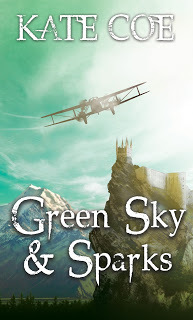
When you first tell people you’re an author how do you describe your books?
The GreenSky series is set in a world of magic, Renaissance technology and electricity, and I’m very much a character author - I love telling stories about people! I’d probably also use the word “delightful” after my wonderful friend @O_T_Curtis repeatedly squeaked it... I also write short stories which are less delightful but possibly more fantastical, and I’m working on an urban fiction that promises to be not-at-all delightful (unless you like assassinations).
What are you currently working on (apart from this interview of course!)?
I’m currently re-writing the fifth novella in the GreenSky series, Empty Skies & Sunlight, and also working on the tenth, Bright Spark & Sunrise. I’ve usually got several projects on the go so I’m also in-progress with an urban fiction trilogy (well, I like assassinations), three short stories, one Dresden Files fan-fiction piece and several blog posts. It stops me getting bored, I suppose...
Why did you decide to do the discoverability challenge?
I’ll echo Jo Hall; because it’s needed. Because I’m sick of the same names coming up in lists, and getting blank stares when I mention a favourite author that I’m astonished more people haven’t read (Emma Newman? Jen Williams? AFE Smith?). I’m fed up with authors that I dislike being held up as brilliant examples, when I don’t like them and I don’t want to read them! But as a bonus, the Discoverability Challenge was as much a challenge for me to read new writing that I might not otherwise have gotten round to for another year as it was to bring women authors to the fore.
Who have you read that you wouldn't have otherwise?
I’ve been challenging myself to read outside my comfort genre of fantasy. I’ve read Annette Young’s Who Killed September Falls, I’ve got Fangirl by Rainbow Rowell next on my pile, I’m dipping my toe into urban fantasy (Beyond the Veil and Ill Wind) and I’m debating reading some classics - for example, I’ve never read any Virginia Woolf and feel I probably should…
What's one thing you've learned from doing the challenge you would never have expected?
It’s really easy to find women authors to read! There are so many fabulous ones; a poke through Goodreads Lists or Fantasy Faction’s suggestions will bring a lot of choice back in any genre. Asking on Twitter is definitely a good option too; other forums tend to be a little more biased but you occasionally get recommended gems.
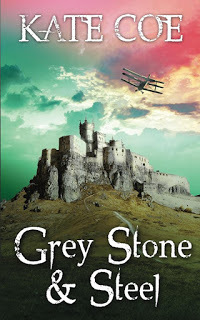
Who are you currently reading? Who would you recommend us reading? I’ve just finished the Divergent Series by Veronica Roth (fine if you like YA - it mostly irritated me) and then detoured via criminal psychology with The Jigsaw Man by Paul Britton. I’m currently working through the Fight Like A Girl anthology along with The Magicians by Lev Grossman and Beyond The Veil during my commute (yes, I read a lot).As for recommendations: - Uprooted by Naomi Novik - I absolutely adored it. - Jo Hall’s Spark and Carousel - great fun! - A Darker Shade of Magic by V E Schwab is a really nice magic system and world; if you like Brandon Sanderson you’ll like this.- I’ve always got a place in my heart for Diana Wynne Jones and Anne McCaffrey; Wynne Jones is thoughtful and fun, and McCaffrey does amazing-world building (with dragons). - Cruelty by Ellen Croshain for a nice dose of Fae mythology, sex and mystery.- If you haven’t read Emma Newman’s Split Worlds series, get on it!
Do you think there is a difference in the way men write about subjects and the way women do?
In my personal opinion, no. I think more men tend towards the grimdark and horror ends of the spectrum, and more women tend towards the romance and fantasy... but I also think that a lot of that has to do with perception in the publishing world and the readership, and unconscious bias in the writers. I don’t think there’s anything stopping any author writing in whatever style and about whatever subjects they’d like to, and I’m really glad there’s more diversity coming through in all the genres - it means more new ideas and more brilliant writing!
To slightly divert into a minor rant, I did recently come across someone (male) on the Interwebz asking how he could write better women characters... but refused to accept the answer of “write them like people” because Women Are Different. While it’s usually presented as a gender problem, I think this is part of the larger problem of writing “other” characters rather than just the opposite gender; I often wonder why aliens in sci-fi are disconcertingly human, when actually there’s no reason they would be! Writing women is just a step along the “different POV and different motivations” path that makes a good storyteller. Although I do wonder when that guy is going to get a clue, and realise that women aren’t aliens... maybe when he starts writing actual aliens?
Why would you say representation is important?
“They’re like me. I can do that.” It’s often a very subconscious bias that means because we don’t see anyone like us, we can’t do it - we’re not good enough, or it’s not a women/men’s world, or simply it’s not something Nice People Write About (erotica, horror, even fantasy). But when you see someone like you doing it and being successful... hey, maybe you can do it too… On a personal level, it’s not as big a thing as seeing a gender (or racial/cultural) representation out there, but I’ve not yet encountered anyone who writes in the same way or style that I do. It’s taken me a good ten years to be able to accept that I don’t write to the same formula as other people or in the same style, and accept that it’s what makes me different - and that it’s a good thing! Magnify that self-doubt and throw in a dose of insecurity and rejection, and it really shows how crippling the lack of someone to look up to can be for new writers.
How do you think the publishing industry addresses discoverability and representation and what would you do if you had the power to change it?
Unfortunately, a lot of the big publishing powers have to stick with what they know to make money, and it’s a real problem; it means the market and the reading world stagnates. They are starting to embrace the powers of new technology and the new world, but it’s a really uncertain time for everyone... I think, if I could change anything, it would be asking the large publishers to just take some risks. Print On Demand and the new forms of reading mean that it doesn’t have to be an expensive print run; they could take a punt on a lesbian romance, a short novelette, a collection of short stories from another culture. It’s all stuff that’s badly needed in a market that sometimes feels very same-y, and although The Same Stuff is what sells right now, it doesn’t help with the future.
Having said that... the small presses are doing their bit to provide that experimentation! If you haven’t come across Grimbold Books, Fox Spirits, PS Publishing, Almond Press and Angry Robot, then go check them out - they’ve got some excellent writers! (Disclaimer; I’m with Grimbold Books and Fox Spirits, but I also read their books - so it’s definitely advice as a reader as well as a writer.)
In one sentence what is your best piece of advice for new writers?
Keep experimenting, keep trying, keep practising, keep writing!
NB: I opted for “books by female authors previously unknown to me” - but I know Jo didn’t put any limits on the Challenge, so there’s definite potential for twists!
Published on April 15, 2016 01:33
April 9, 2016
Review - The Redensive Epiphany of Pouty McNavel
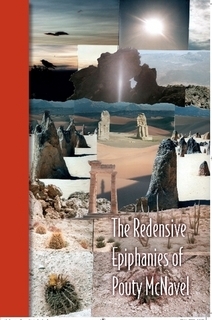
It was upon one of my infrequent trips to the conglomeration of buildings known only as - The Centre - where I happened upon an anonymous diary in a back street shop I have not been able to place since. This diary was written by someone obviously undergoing a psychotic break and I present the opening pages here, only in the hope that the diarist will recognise himself and get in contact; or at the very least seek the redensitive help he so obviously needs...
Recent history sadly doesn't recall the exact cast, location or motivation for the experiment. However its outcome has come to be known as The Redensive Epiphanies of Pouty McNavel
Early in the early 21st century a selection of the <word unclear> minds were sent to an island, for reasons unknown. This is their story. Or stories, or facts, in the case of.
Decades previous to finding this marvel the events of that far gone halcyon time had existed only in heavily redacted documents tenuously secured through brave Freedom of Information requests by students and aficionados of the bizarre. It is time to add the words back in, to redensify those documents; in short, it is time to reveal to the world - The Epihany - as the ephemeral collection has become known.
Enter the first story in the collection - The Redensive Epiphany of Pouty McNavel which is only surpassed by one of the later stories - The Redensive Epiphany of Pouty McNavel whose author leaves us no map except the pattern of punctuation which points to a greater understanding of the cosmos which is perfectly reflected in the night sky once every thousand years. One may ask how they knew, but that would be the wrong question.
Naturally one author regales us with the thoroughly unlikeable qualities of the title character before he, or she, is redeemed in later tales, only to be cast further into infamy in yet later tales. The message is almost clear, but will take repeated readings to fully divine. Some of the stories break cover, and codify other, possible realities - titles in two of them break the mould in ways that yet define and reconstruct it anew.
Solely recorded in the back of the book is a list of unlikely names, but these surely are not the authors of this collection, merely the brave souls who went before us on this exploration? The count of tales and count of names doesn't match - a further redaction? Each is captured in the scratchy atonal pictures of the time.
Inscribed are the names hallowed in the annals of our especial pursuit: - Sarah Ellender - that tragic figure, that valiant first explorer, a cautionary tale, Gordon Fraser , the remarkable capturer of light. Helen Callaghan the one they never knew was there with them. David Gullen - just this guy? Or the ringmaster? Melanie Garrett - they thought she was a plant, she thought they were , Gaie Sebold has cheated death more times than there have been books of poetry on the NY Times bestseller list, Chuck Dreyer - it is best not to dwell on what happened to Chuck, Troy McLure - nothing need be said about Troy, for obvious reasons and Sumit Dan - the one whose own epiphany will possibly surpass McNavels!
Vast are the gulfs in understanding this pseudonymous collection, but follow the links and you shall be enlightened... Their reactions are captured, to receiving the FOI documents in return for the questions we have all been asking ourselves since we discovered the existence of The Epiphanies - "Who is Pouty McNavel?" "What are his, or her Epiphanies?" and, perhaps, most importantly of all - "Why are they redensive?"
Evidently- it is the answer to the last that brought me to this collection. Redensive is a word that is reserved for the black dictionaries of course. Words that 'shall not be spoken' or words that in, and of, themselves scream or flail or gibber. To which we delvers return to again and again, sometimes to the detriment of our sanity. Here. Here in its fullest glory. Here the barest black dictionary entries are given form and here the word soars and swoops and exults.
Published on April 09, 2016 02:46
Pete Sutton's Blog
- Pete Sutton's profile
- 14 followers
Pete Sutton isn't a Goodreads Author
(yet),
but they
do have a blog,
so here are some recent posts imported from
their feed.



